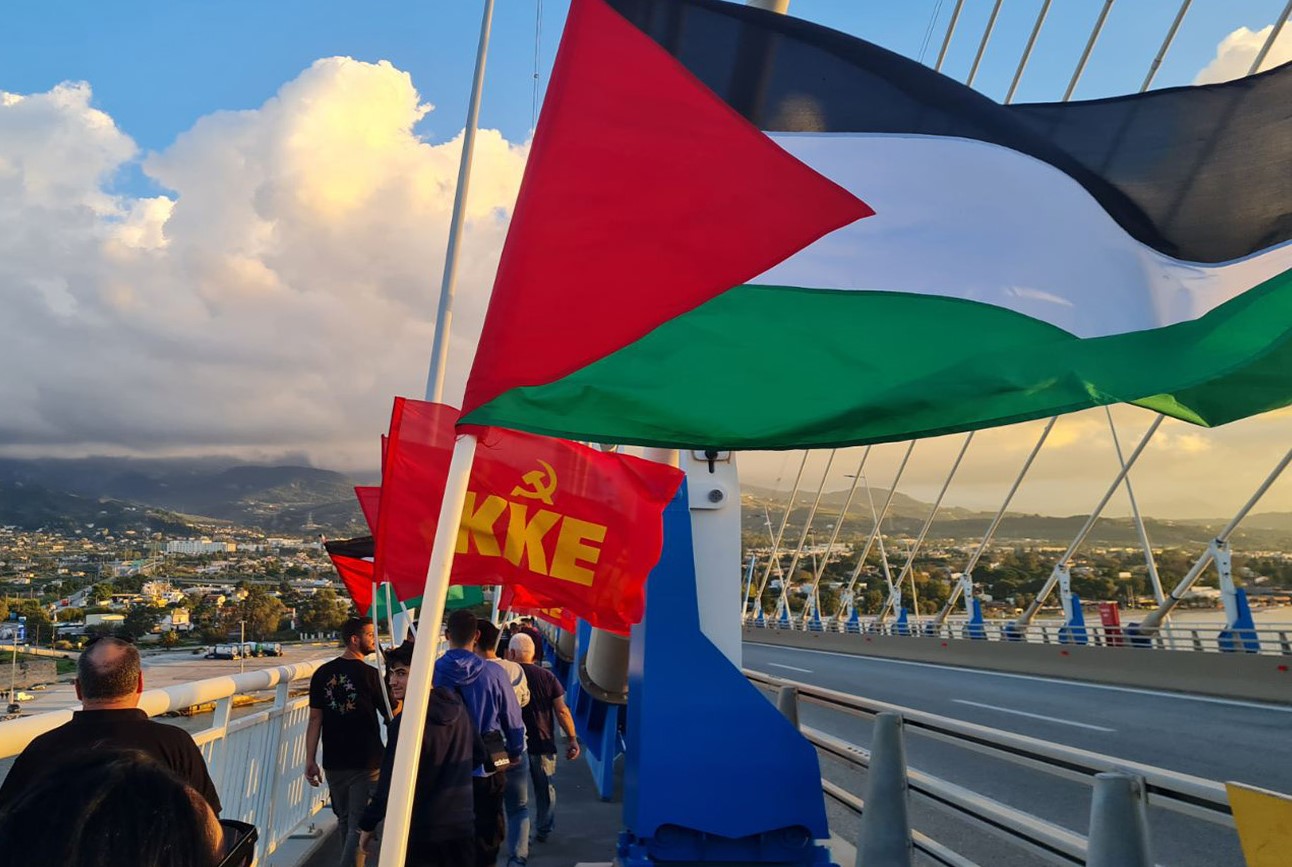As with the war in Ukraine, different communist parties around the world have taken different and even opposite positions regarding the current Israeli bloodbath in Gaza after the 7 October Hamas attack. The stance of the Communist Party of Greece (KKE) is one of principled support for the struggle of the Palestinian people, far removed from other communist parties, which have succumbed to the pressure of bourgeois public opinion. However, there are several aspects of the KKE position on Palestine/Israel we disagree with, and which we think are at odds with a genuine communist position.
Some communist parties have taken a completely incorrect position. Thus, at a time when Israeli bombs are raining on Gaza, killing thousands of civilians and levelling houses and infrastructure, the French Communist Party (PCF) and its leader Fabien Roussel decide it is the time to join the chorus of the ruling class in condemning… not Israel, but the leader of the France Insoumise, Jean-Luc Melenchon. Why? Because he has not bowed to the demand of the ruling class that any comment on the situation must start with a condemnation of Hamas as a “terrorist” organisation.
Similarly, the Austrian Communist Party (KPÖ) insists on equating the oppressed and the oppressors in this conflict and has markedly abstained from participating in the Palestine solidarity movement, remaining largely silent on the question. They have given in to the pressure of bourgeois public opinion demonising solidarity with the Palestinian people as outright support for Hamas: a slander that is particularly strong in the German-speaking countries. This has led to expressions of discontent in its ranks, mainly in the youth organisation, which is correctly attempting to resist the party line on this question.
As Leninists, we understand that foreign policy cannot be separated from domestic policy. Therefore, it is not a surprise that those communist parties which have a social democratic policy at home, one of managing the crisis of capitalism instead of working for its overthrow, will have a social-chauvinist or at best a petty-bourgeois pacifist position abroad.
Thus, many communist parties have come out with a position which basically amounts to making appeals to the “international community” and international institutions to put pressure on Israel to respect “international humanitarian law”, etc. By contrast, Lenin was scathing about the role of the League of Nations, the predecessor of the UN, which he described as a “thieves’ kitchen”.
The role of communists is not to sow illusions in the UN, which has passed countless resolutions on Palestine over decades, all of them worthless, but rather to explain how “international law” and “international rules” are a complete sham, designed to fool working people and obscure the real nature of imperialist domination and inter-imperialist conflict.
The position of the KKE
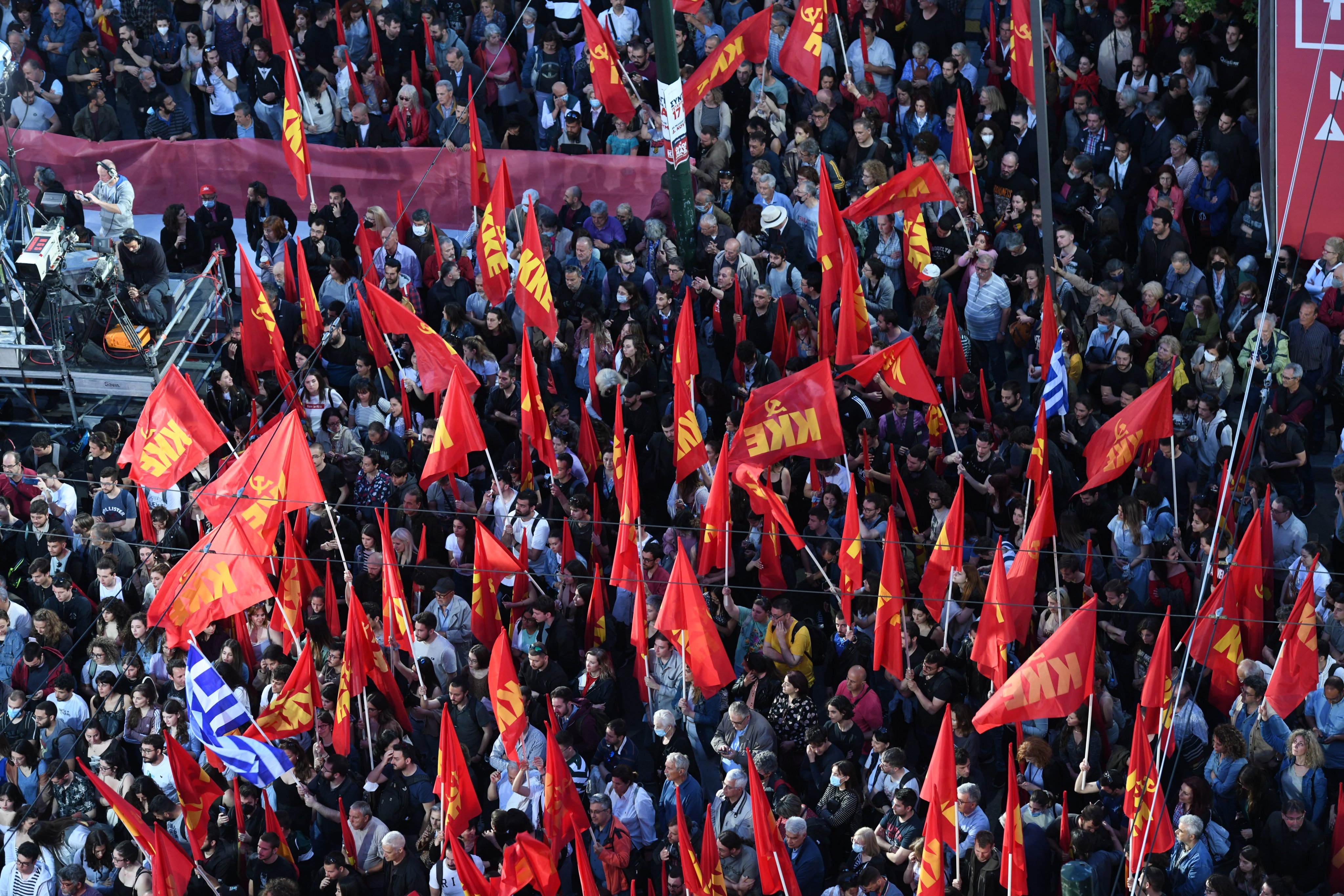 The KKE and its youth organisation (KNE) have played a very important role in the Palestine solidarity movement / Image: Γραφείο Τύπου της ΚΕ του ΚΚΕ, Twitter
The KKE and its youth organisation (KNE) have played a very important role in the Palestine solidarity movement / Image: Γραφείο Τύπου της ΚΕ του ΚΚΕ, Twitter
It is therefore worth examining the position of the Communist Party of Greece (KKE), which stands out from many of the other communist parties. On 9 October, the party issued a strongly worded statement, with a clear political line, condemning: “the years-long occupation of the Israeli state and the crimes it systematically commits against the Palestinian people”. It condemns “the support of the USA, the EU and their allies” for Israel’s crimes; denouncing the complicity of their own government in Greece and offering clear solidarity for the Palestinian struggle:
“The Palestinian people have the right to defend their rights and need greater popular support and solidarity to continue their struggle to end the Israeli occupation”. (The Palestinian people have the right to defend their rights and need greater popular support and solidarity - Press Office of the KKE, Oct 9)
The KKE and its youth organisation (KNE) have played a very important role in the Palestine solidarity movement, and have not bowed to the pressure of bourgeois public opinion. We fully agree with this position and the KKE should be praised for having taken a firm stand against imperialism and against its own ruling class.
Nevertheless, we also think that the political and strategic position adopted by the KKE regarding the conflict in Palestine-Israel has several shortcomings. It is the duty of communists to raise differences of opinion in a comradely manner and debate them out. In Lenin’s time, this was the norm. He conducted very sharp polemics with those closest to him, as he considered theoretical clarity of utmost importance.
The main disagreements we have with the KKE are as follows: its support for a two-state solution, its lack of a socialist programme for Palestine, and its unclear position about Stalin’s support for the partition of Palestine in 1947/48.
A two-state solution?
The first point we would like to raise is about what the KKE says is the aim of the Palestinian struggle: “to continue their struggle to end the Israeli occupation, for an independent state on the 1967 borders, with East Jerusalem as its capital.” (KKE, 9 October statement)
That is, the KKE clearly defends a two-state solution on the basis of the 1967 borders, that is, a Palestinian state side by side with an Israeli state. This is underlined in another, longer article by Giorgos Marinos, a member of the party’s Political Bureau on October 20, 2023:
“The KKE irrefutably, with responsibility and the criterion the common struggle of the peoples, stands resolutely at the side of the Palestinians and fights for the end to the Israeli occupation, for an independent, united and viable Palestinian state, next to Israel, on the 1967 borders, with East Jerusalem as its capital, for the return of refugees and the release of political prisoners from Israeli prisons” (‘Intensification of the struggle to end the Israeli occupation – Solidarity with the Palestinian people’, our emphasis)
The position is repeated in an article by the party’s general secretary Dimitris Koutsoumbas in the party’s official paper Rizospastis (October 20-21):
“The content of the demands and slogans can be summarised as follows: We emphasise the right of the Palestinian people to a free and independent Palestine on the 1967 borders, with East Jerusalem as its capital. We demand the return of all Palestinian refugees to their homes, on the basis of the relevant UN resolutions.” (On the military conflict between Israel and Palestine and the developments in the region)
There are in our opinion several problems with this position.
First of all, the two-state solution has been proven to have been impossible in practice, as we have explained in detail elsewhere. The Oslo Accords of 1993 were seen precisely as a road map towards a two-state solution by the Palestinian leadership. In fact, they were a complete betrayal and sell out of the Palestinian struggle. Israel kept control of a large section of the West Bank and of the external borders, Jewish settlers were allowed to remain in the Palestinian territory and settlements have continued to expand.
Meanwhile, the questions of the right of return and the state of East Jerusalem were postponed to be discussed in the long distant future (read: never) and in exchange a pitiful Palestinian “Authority” with no real power was created with the sole aim of subcontracting the policing of the Palestinian masses to the rotten leadership of the PLO.
The KKE could argue that what has failed is the Oslo Accords, but that a genuine two-state solution is what the Palestinians should fight for. However, even this position would ultimately lead to a dead end.
Which leads us to the second point of criticism of the position of the KKE. So as long as the capitalist state of Israel exists, the Israeli bourgeoisie will never accept the existence of a genuine viable Palestinian state as it considers it a threat to its “national security”. This has been proven, not in theory, but in practice. Since the Oslo Accords, the number of Zionist settlements in the West Bank has continuously increased, while Gaza remains completely blockaded by the state of Israel. Israel’s military interventions in Gaza, as well as in the West Bank, have become increasingly frequent and violent, undermining the very existence of even the limited Palestinian entity that is the Palestinian Authority.
Furthermore, it is difficult to see how a capitalist state of Palestine would be viable in the territory of the 1967 borders, side-by-side with a powerful imperialist capitalist state of Israel. Such a capitalist Palestine, if it were possible, would be economically dominated by its powerful neighbour and remain at best its semi-colony.
It is the practical experience of the last 30 years that has led a majority of Palestinians to reject a two-state solution. In September this year, a poll by the Palestinian Center for Policy and Survey Research found that 67 percent of Palestinians reject a two-state solution, with only 32 percent in support. The same poll shows that “71 percent believe the two-state solution is no longer practical due to settlement expansion”. A separate poll conducted by the Arab World for Research and Development on 15 November found that 74 percent of Palestinians are in favour of one state, while only 17 percent want a two-state solution. An overwhelming majority of Palestinians reject the Oslo Accords altogether.
Incidentally, even if one were to accept the idea of a two-state solution, why should a Palestinian state be established “on the 1967 borders” (presumably what the KKE means is the pre-1967 war borders) which represented only 22 percent of historic Palestine? Why not go back to the 1947 UN partition plan borders, where a Palestinian state represented 44 percent? The 1967 borders represent not only accepting partition itself but also the further territorial conquests by the State of Israel in the period after it.
No mention of the struggle for socialism and workers’ power
Perhaps the most glaring and surprising omission in all the KKE statements on the question of Palestine is that the struggle for socialism is not mentioned at all. The only conclusion that one can draw from reading official KKE statements and those of the party’s leading comrades in recent weeks is that they see the strategic aim of the Palestinian struggle as the formation of two capitalist states, not the struggle for socialism.
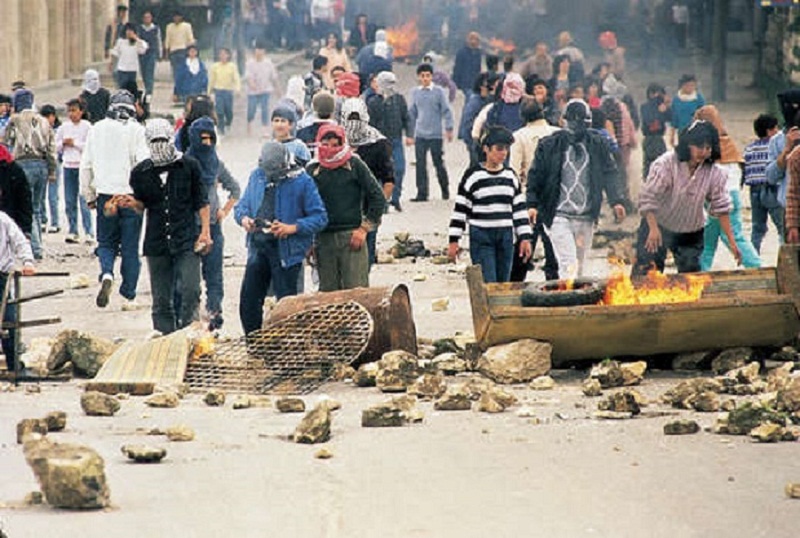 How do the KKE comrades then justify the absence of any reference to the struggle for socialism regarding the struggle for the liberation of Palestine? / Image: Abarrategi, Wikimedia Commons
How do the KKE comrades then justify the absence of any reference to the struggle for socialism regarding the struggle for the liberation of Palestine? / Image: Abarrategi, Wikimedia Commons
This is in direct contradiction with the KKE’s stated line on all other national and international affairs. In these cases the party, correctly, stresses the need to break with any stageism, to put the struggle between workers and Capital at the forefront, and affirms that the character of the revolution is socialist (see for instance ‘On the revolutionary regroupment of the communist movement and its independence from the interests of the bourgeoisies and their allies’, Elisseos Vagenas, Rizospastis, 14-15 October 2023)
How do the KKE comrades then justify the absence of any reference to the struggle for socialism regarding the struggle for the liberation of Palestine? In an article published on 10 November by the International Relations Section of the CC of the KKE, they attempt to address this question. Let’s quote from the article at some length:
“Some people criticise the KKE, saying that while in all other cases it talks about the necessity and timeliness of socialism but in this case it focuses only on the right to the establishment of a Palestinian state. (...)
“Socialism is necessary and timely for the entire world, for every capitalist country. However, under the conditions in which the workers’-people’s struggle is carried out in every country, important ‘links’ emerge, which can give impetus to the class struggle. It is a crucial issue for the Communist Party and the labour movement to take these ‘links’ into account in the struggle for socialism, for the preparation, rallying and mobilisation of the workers’-people’s forces. In Palestine today, the key ‘link’ is the throwing off of the foreign Israeli occupation and the formation of the Palestinian state.“Therefore, it is the task of the Palestinian working class and its vanguard, the CP, to formulate such a line that connects this ‘link’ with the cause of the struggle for social emancipation, workers’ power and the building of the new, socialist society.
“It is our task, the task of the workers and youth in other countries, to support this struggle and to stand by its side now in the conflict with the occupation forces.” (Article by the International Relations Section of the CC of the KKE. Short answers to current ideological-political questions concerning the Israeli attack and massacre against the Palestinian people in the Gaza Strip, Nov 10)
This is very confused, and does not really answer the question. The comrades of the KKE seem to be saying that the struggle for socialism is necessary everywhere in the world and that immediate questions of the class struggle need to be linked to the question of socialism. But then, why do KKE statements on Palestine not mention socialism at all?
Of course, we agree with the KKE when it says that the struggle for national liberation is a crucial part of the program of communists in Palestine. Yes, we agree that Palestinian communists must formulate a line which helps the masses of workers, youth and the poor understand the link between that struggle and the struggle for socialism.
But this is not how the question is formulated in the “Short answers” document of the KKE’s CC International Relations Section. Although the document affirms that conditions for socialism are ripe “in the entire world”, it does not say anything about the class character of a future Palestinian state, nor is this question raised anywhere else in the KKE statements on the matter, so we can only assume that the comrades are talking about a capitalist state. The logic of the argument therefore presents “the throwing off of the Israeli occupation and the formation of the Palestine state” as a separate stage from the struggle for socialism.
Furthermore, the document says that the task of the Palestinian communists is to formulate a line that connects national emancipation with the struggle for workers’ power, but then goes on to say that the task of the workers and youth in other countries is to “support the struggle… against the occupation forces”. It would seem like the tasks of communists in Palestine and the tasks of communists in the rest of the world are different.
From this article, one might draw the impression that it is only the Palestinian communists who have to explain the need to struggle for socialism and workers power, while communists elsewhere in the world have to limit themselves to internationalist solidarity without talking about socialism (as the KKE has done in its recent statements). Such a position would be wrong, and at odds with the approach of Lenin and the early Communist International.
Of course, the task of communists around the world is to support the Palestinian struggle, but that in itself is not enough. We are not merely solidarity activists. We are communists, and therefore our duty is also to explain how the liberation of Palestine can be achieved, which forces can lead it to victory, which classes are the allies of the Palestinian cause, etc.
This is what Marx said about the role of communists in the wider workers’ movement:
“The Communists, therefore, are on the one hand, practically, the most advanced and resolute section of the working-class parties of every country, that section which pushes forward all others; on the other hand, theoretically, they have over the great mass of the proletariat the advantage of clearly understanding the line of march, the conditions, and the ultimate general results of the proletarian movement.” (Communist Manifesto, our emphasis)
Furthermore, the KKE is not just taking up the task of simply supporting the struggle against the occupation forces. In its statements, it has gone beyond that to say that the aim of the Palestinian struggle should be a two-state solution, something which is not only not viable under capitalism but also rejected by the overwhelming majority of the Palestinians today. Therefore, it is not just a question of the party not raising the question of socialism, but that instead, it is raising a perspective (a two-state solution) which, at least in words, is shared by the UN and even by US imperialism!
In the recent period, the KKE has taken up lots of international issues and expressed opinions about all the important developments of the class struggle everywhere. That is correct. And in all these cases, it has stressed the need to fight for socialism and against capitalism. That is also correct, and on that we agree with the comrades of the KKE. But it would seem that this is not the case in relation to Palestine, where the KKE’s position is one of international proletarian solidarity, but limits itself to the struggle for a capitalist Palestinian state, without any mention of the struggle for socialism. That, we think, is a serious mistake and is in contradiction with the stated general political line of the party.
Justifying the partition of Palestine in 1948?
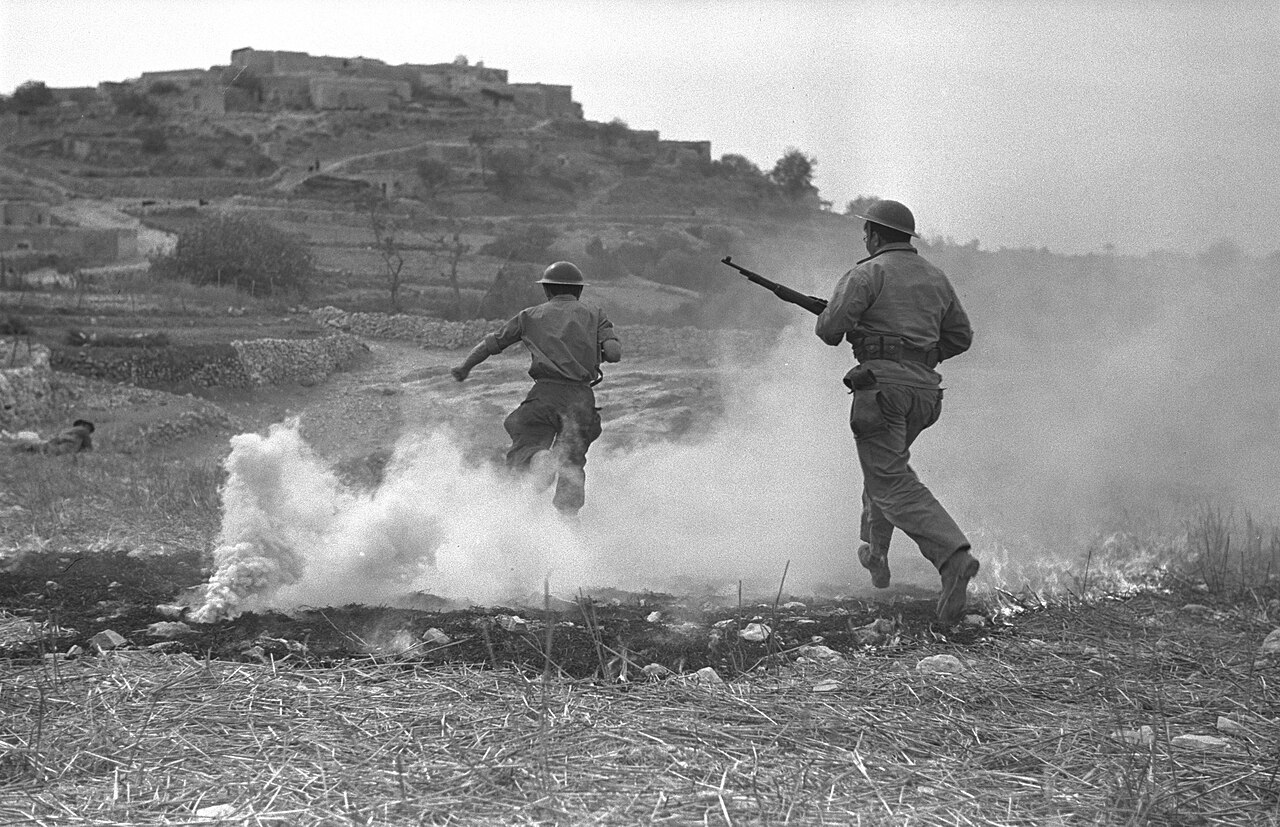 The partition of Palestine was an imperialist crime aimed at pitting Arabs against Jews / Image: Government Press Office Israel, Flickr
The partition of Palestine was an imperialist crime aimed at pitting Arabs against Jews / Image: Government Press Office Israel, Flickr
Finally, there is one last aspect of the KKE position on Palestine that is worth commenting on. In the article by comrade Marinos quoted earlier, he says:
“The occupation was imposed in 1947-1948 when the Palestinian land was divided up and the State of Israel was established and has perpetuated to this day, with the support of the USA, NATO and the EU, in the continual and intensifying imperialist competition for control of the region.” (‘Intensification of the struggle to end the Israeli occupation – Solidarity with the Palestinian people’, Giorgos Marinos, Member of the PB of the CC of the KKE 20.10.2023)
He is saying clearly that occupation was imposed in 1947-48 with the creation of the State of Israel. We understand that comrade Marinos makes a negative appraisal of this fact.
But then, the “Short answers” document by the KKE CC says:
“The existence of the Israeli state is a reality today. The massacre of the Jews by the Nazis and the anti-Semitism promoted by the bourgeois classes before the Second World War in many capitalist countries led to the acceptance by the USSR and the international labour movement of the creation of the state of Israel alongside the state of Palestine.”
This clearly justifies and supports the 1948 establishment of the state of Israel and the support for it by the USSR. We must remember that the creation of Israel at the time was based on the mass ethnic cleansing of 700,000 Palestinians from their lands!
Here we need to say clearly: the partition of Palestine was an imperialist crime aimed at pitting Arabs against Jews and using one against the other in order to maintain imperialist domination. British imperialists above all were responsible for this crime, having promised both peoples the same territory in a cynical divide-and-rule way, a tactic they implemented throughout the British mandate over Palestine and had used before throughout the British Empire (for instance in Ireland and in the partition of India).
In 1947, the Soviet Union backed the partition plan at the United Nations. This was not done in solidarity with the Jewish people, as the article suggests, but rather in an attempt to undermine the position of British imperialism in the Middle East. The USSR was the first country to recognise the newly created State of Israel and Stalin supplied the Zionists with weapons via Czechoslovakia. Soviet support for the setting up of the State of Israel in 1948 was a betrayal with catastrophic consequences for all the communist parties throughout the Middle East and beyond. Such a position cannot be justified and made the USSR complicit in the crime that was committed against the Palestinian people.
Leninist position on Zionism and Palestine
The Leninist tradition in relation to the Jewish question in general, and in particular regarding the Zionist aim of the formation of a Jewish state in Palestine, is clear. The Bolsheviks in Russia fought relentlessly against anti-Semitism, which was a reactionary tool of Russian Tsarism to divide the working class and divert the workers’ anger towards an oppressed minority, the Jews, to divert them from the struggle for their own emancipation. At the same time, the Russian Marxists were implacably opposed to Zionism, as was the labour movement in general.
The Communist International opposed and denounced the imperialist machinations regarding Palestine. The Second Congress of the Comintern in 1920 approved the Theses on the National and Colonial Question, drafted by Lenin, which included the following section:
“11.f) It is necessary continually to lay bare and to explain among the broadest masses of all, but in particular of the backward, countries the deception committed by the imperialist powers with the help of the privileged classes in the oppressed countries when, under the mask of politically independent states, they bring into being state structures that are economically, financially and militarily completely dependent on them. The Zionists’ Palestine affair can be characterised as a gross example of the deception of the working classes of that oppressed nation by Entente imperialism and the bourgeoisie of the country in question pooling their efforts (in the same way that Zionism in general actually delivers the Arab working population of Palestine, where Jewish workers only form a minority, to exploitation by England, under the cloak of the creation of a Jewish state in Palestine). In today’s economic conditions there is no salvation for the weak and dependent nations outside of an alliance with Soviet Republics” (our emphasis.)
Furthermore, in the period of the Second and Third Congress of the Comintern, there was a Jewish workers’ organisation that participated in the proceedings with fraternal delegates, Poale Zion. The leadership of the Comintern insisted that as a precondition for joining the International they should abandon all remnants of the Zionist ideology. Poale Zion advocated that the concentration of Jewish proletarian masses in Palestine would provide the best conditions for a revolutionary struggle for socialism, revealing their confused approach (see To the Workers of the Union of Jewish Communists, letter from the ECCI, 1921). In the end, the Communist Poale Zion split, with a section reverting back to Zionism and another joining the Communist International by becoming part of the local communist parties in the countries they lived in, as the Comintern had demanded.
The Nazi Holocaust in Europe during World War II gave enormous impetus to the Zionist movement, but that does not justify any support for the formation of Zionist state in Mandate Palestine, a land that was already populated. Trotsky, in 1940, warned repeatedly that the creation of a Jewish state in Mandate Palestine would not be a safe haven for Jews fleeing persecution in Europe, but a bloody trap:
“The attempt to solve the Jewish question through the migration of Jews to Palestine can now be seen for what it is, a tragic mockery of the Jewish people. Interested in winning the sympathies of the Arabs who are more numerous than the Jews, the British government has sharply altered its policy toward the Jews, and has actually renounced its promise to help them found their ‘own home’ in a foreign land. The future development of military events may well transform Palestine into a bloody trap for several hundred thousand Jews. Never was it so clear as it is today that the salvation of the Jewish people is bound up inseparably with the overthrow of the capitalist system.” (July, 1940)
No people can be free as long as it oppresses another. In 1947-48, the position of the Trotskyists in Palestine and elsewhere was against partition and for working class unity against imperialism.
A revolutionary way forward for the Palestinian struggle
The only way to find a solution to the conflict is through the overthrow of the Zionist ruling class in Israel. That requires a revolutionary struggle, which links the national liberation of the Palestinian masses with their social emancipation, uniting democratic and socialist demands and goals. Only such a struggle would have any chance of splitting Israel across class lines, thus weakening its ruling class, a necessary condition for victory.
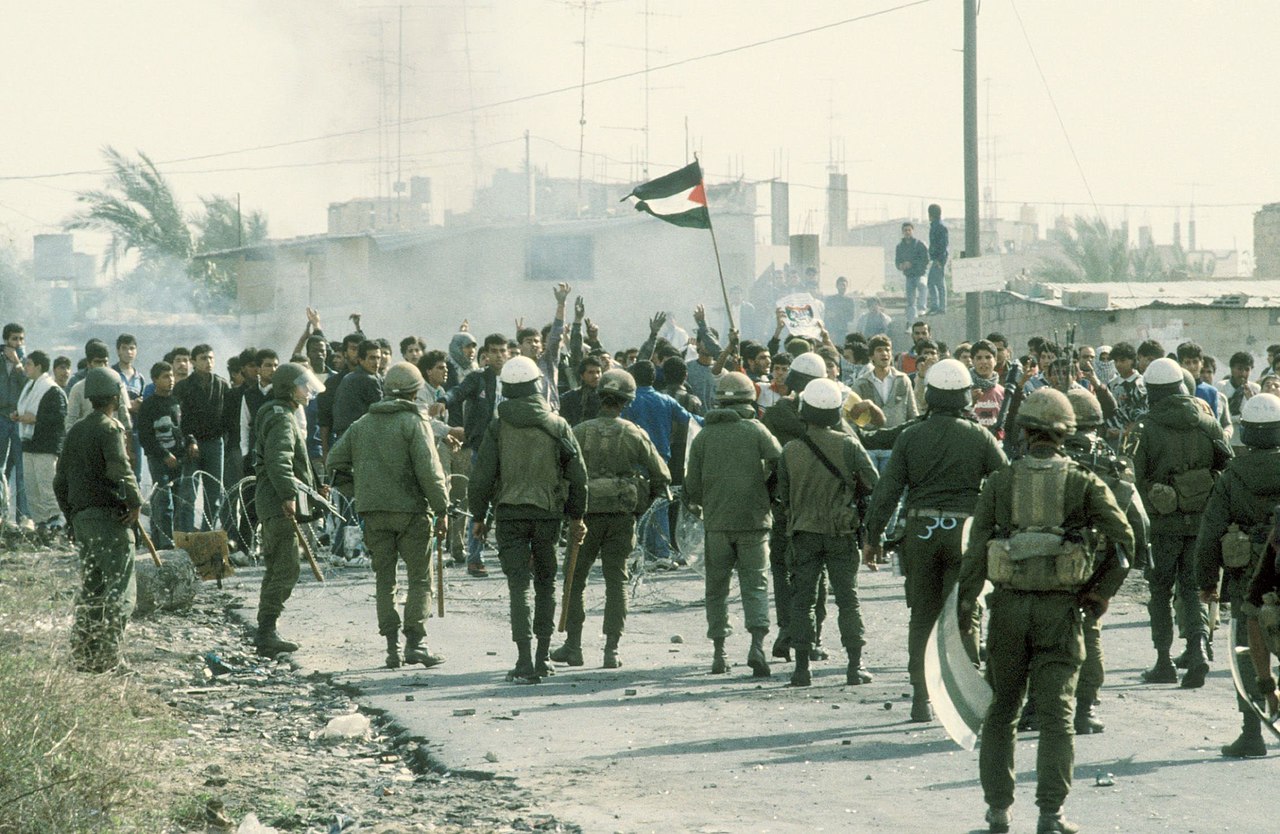 The only way to find a solution to the conflict is through the overthrow of the Zionist ruling class in Israel / Image: Efi Sharir, Wikimedia Commons
The only way to find a solution to the conflict is through the overthrow of the Zionist ruling class in Israel / Image: Efi Sharir, Wikimedia Commons
That’s why the struggle of the Palestinian masses can only succeed as a revolutionary struggle to overthrow all the reactionary capitalist regimes in the region, in the Arab countries and in Israel. The road to liberation for the Palestinians goes through Cairo, Amman and Beirut. A revolutionary overthrow of the reactionary Arab regimes, which play only lip service to the Palestinian cause, but are in fact accomplices of Israeli capitalism, would change the balance of forces in the region.
A series of workers’ states in the region would put the question of socialism on the agenda. On the basis of such a revolutionary socialist struggle, it would be possible to envisage a democratic and secular state in which there would be no national oppression. Under capitalism, that would be impossible to realise. A single democratic and secular capitalist state is as utopian as two capitalist states. A secular and democratic state could only come about as a workers’ state. Communists stand for a Socialist Federation of the Middle East as the only way to throw off the yoke of imperialism from the region.
Of course, because of the animosity and mistrust that has been built over decades between Palestinians and Israeli Jews, it might be necessary for a period of time for such a single state to contain provisions of autonomy for both national groups, perhaps in the form of a Federal Socialist State. This was the state structure that Lenin proposed for the workers' state founded after 1917: a Russian Soviet Federative Socialist Republic. But in any case, the revolutionary overthrow of the Zionist capitalist ruling class of Israel is the only way to make any of this possible.
These are all important questions of revolutionary strategy, which must be clarified. The KKE, to its credit, has taken a principled position in support of the struggle of the oppressed Palestinians, which sets it apart from most other communist parties around the world, and on this we stand united. But on the question of the revolutionary strategy and the goals of the struggle of the Palestinian workers and people, the position of the KKE reverts to stageism, supports a failed solution which the Palestinian masses reject, and is found lacking.
We call on the comrades of the KKE to consider these questions, which are raised in a comradely spirit with the aim of sharpening the understanding and intervention of communists in the Palestine solidarity movement; as well as the struggle of communist forces in Palestine, Israel and the whole of the Middle East.

